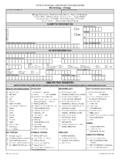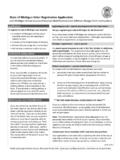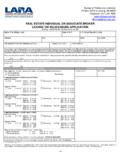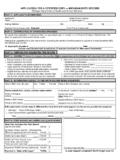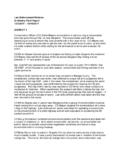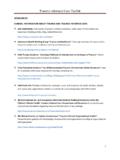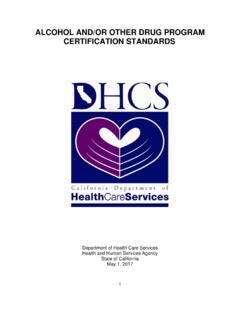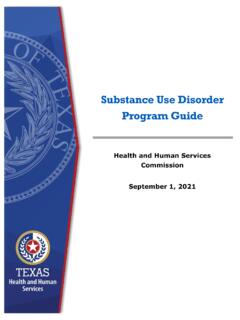Transcription of TREATMENT POLICY #10, Residential Treatment Continuum …
1 Medicaid Managed Specialty Supports and Services Program FY20. Attachment TREATMENT POLICY #10. SUBJECT: Residential TREATMENT Continuum of Services ISSUED: May 3, 2013, December 1, 2016. EFFECTIVE: January 16, 2017. PURPOSE: The purpose of this POLICY is to establish the requirements for Residential services to the extent licensing allows based on the American Society of Addiction Medicine (ASAM) Level of Care (LOC) criteria, and to support individualized services that maintain cultural, age, and gender appropriateness. SCOPE: This POLICY impacts the Prepaid Inpatient Health Plan (PIHP) and its adult Residential LOC service provider network. BACKGROUND: Residential TREATMENT includes a wide variety of covered services with the provision of these services expected to be individualized to the needs of the client. The Administrative Rules for Substance Abuse Services, established in 1981, are very limited in indicating what activities or services must be provided to clients in a Residential program.
2 They do indicate, however, that ten hours of scheduled activities, with two of those hours being formalized counseling, must take place each week. At the time of their creation, these standards adequately met the needs of clients being served. In the time since the rules were promulgated, there have been many changes in the TREATMENT field. The emergence of evidence-based best practices, the ASAM Criteria Third Edition (ASAM. Criteria), and the stages-of-change models that have been developed. These changes have essentially left the administrative rules obsolete in the area of recommended services. This POLICY seeks to establish Residential TREATMENT criteria that will result in services that are provided in accordance with those outlined by ASAM, and are more reflective of services that have been shown to be effective in providing care to individuals receiving Residential care. Throughout the current Residential level of services assessment, TREATMENT planning, and recovery support preparations are required, and must be included in the authorized TREATMENT services.
3 Historically, Residential services have been defined by length-of-stay, not by the needs of the client. This has resulted in essentially two descriptors for Residential services: Short-term Residential : less than 30 days in a program Long-term Residential : 30 days or more in a program Medicaid Managed Specialty Supports and Services Program FY20. Attachment This view of Residential TREATMENT has contributed to the expectation that all clients will equally benefit from the services being offered and resulted in clients with varying needs being admitted into the same program. This makes it more difficult to assure and provide services that are focused on addressing the individual needs of each client. Definitions Core Services - are defined as TREATMENT Basics, Therapeutic Interventions, and Interactive Education/Counseling. See the chart in the Covered Services section for further information.
4 Counseling - an interpersonal helping relationship that begins with the client exploring the way they think, how they feel and what they do, for the purpose of enhancing their life. The counselor helps the client to set the goals that pave the way for positive change to occur. Crisis Intervention - a service for the purpose of addressing problems/issues that may arise during TREATMENT and could result in the client requiring a higher LOC if intervention is not provided. Face-to-Face - this interaction not only includes in-person contact, it may also include real-time video and audio linkage between a client and provider, as long as this service is provided within the established confidentiality standards for substance use disorder services. Facilitates Transportation - assist the client, potential client, or referral source in arranging transportation to and from TREATMENT . Family Counseling - face-to-face intervention with the client and their significant other and/or traditional or non-traditional family members for the purpose of goal setting and achievement, as well as skill building.
5 Note: in these situations, the identified client need not be present for the intervention. Family Psychotherapy - face-to-face, insight-oriented interventions with the client and their significant other and/or traditional or non-traditional family members. Note: in these situations, the identified client need not be present for the intervention. Group Counseling - face-to-face intervention for the purpose of goal setting and achievement, as well as skill building. Group Psychotherapy - face-to-face, insight-oriented interventions with three or more clients. Individual Assessment - face-to-face service for the purpose of identifying functional and TREATMENT needs, and to formulate the basis for the Individualized TREATMENT Plan to be implemented by the provider. Individual Counseling - face-to-face intervention for the purpose of goal setting and achievement, and skill building. Medicaid Managed Specialty Supports and Services Program FY20.
6 Attachment Individual Psychotherapy - face-to-face, insight-oriented interventions with the client. Individual TREATMENT Planning - direct and active client involvement in establishing the goals and expectations for TREATMENT to ensure the appropriateness of the current LOC, to ensure true and realistic needs are being addressed, and to increase the client's motivation to participate in TREATMENT . TREATMENT planning requires an understanding that each client is unique and each TREATMENT plan must be developed based on the individual needs, goals, desires, and strengths of each client and be specific to the diagnostic impression and assessment. Interactive Education - services that are designed or intended to teach information about addiction and/or recovery skills, often referred to as a didactic education. Interactive Education Groups - activities that center on teaching skills to clients necessary to support recovery, including didactic education.
7 Medical Necessity - TREATMENT that is reasonable, necessary, and appropriate based on individualized TREATMENT planning and evidence-based clinical standards. Peer Support - individuals who have shared experiences of addiction and recovery, and offer support and guidance to one another in a TREATMENT setting. Professional Staff as identified in the Staff Qualifications for SUD TREATMENT Services portion of the PIHP/MDHHS Contract include Substance Abuse TREATMENT Specialists, Substance Abuse TREATMENT Practitioner, Specially Focused Staff and TREATMENT Supervisor. Psychotherapy - an advanced clinical practice that includes the assessment, diagnosis, or TREATMENT of mental, emotional, or behavioral disorders, conditions, addictions, or other bio- psychosocial problems and may include the involvement of the intrapsychic, intrapersonal, or psychosocial dynamics of individuals (Michigan Administrative Code, Social Work General Rules).
8 Recovery: A highly individualized journey of healing and transformation where the person gains control over his/her life. It involves the development of new meaning and purpose, growing beyond the impact of addiction or a diagnosis. This journey may include the pursuit of spiritual, emotional, mental, and physical well-being. ( ). Recovery Planning - purpose is to highlight and organize a person's goals, strengths, and capacities and to determine what barriers need to be removed or problems resolved to help a person achieve their goals. This should include an asset and strength-based assessment of the client. Recovery Support and Preparation - services designed to support and promote recovery through development of knowledge and skills necessary for an individual's recovery. Medicaid Managed Specialty Supports and Services Program FY20. Attachment Referral/Linking/Coordination of Services - office-based service activity performed by a primary clinician, or other assigned staff, to address needs identified through the assessment, and/or to ensure follow through with access to outside services, and/or to establish the client with another substance use disorder service provider.
9 Substance Use Disorder - a term inclusive of substance abuse and dependence, which also encompasses problematic use of substances. Toxicology Screening - screening used for the purpose of tracking ongoing use of substances when this has been established as a part of the TREATMENT plan or an identified part of the TREATMENT program. (This may include onsite testing such as portable breathalyzers or non-laboratory urinalysis). Withdrawal Management - monitoring for the purpose of preventing/alleviating medical complications related to no longer using, or decreasing the use of, a substance. REQUIREMENTS: The Residential levels of care from ASAM are established based on the needs of the client. As part of the purpose of this document, the short and long-term descriptors will no longer be used to describe Residential services. PIHPs will need to have the capacity to provide a Residential Continuum that will meet the needs of clients at ASAM levels , , , and frequency and duration of Residential TREATMENT services are expected to be guided by the ASAM levels of care, and are described as follows: ASAM Level Clinically Managed Low-Intensity Residential Services These services are directed toward applying recovery skills, preventing relapse, improving emotional functioning, promoting personal responsibility, and reintegrating the individual in the worlds of work, education, and family life.
10 TREATMENT services are similar to low-intensity outpatient services focused on improving the individual's functioning and coping skills in Dimension 5 and 6. The functional deficits found in this population may include problems in applying recovery skills to their everyday lives, lack of personal responsibility, or lack of connection to employment, education, or family life. This setting allows clients the opportunity to develop and practice skills while reintegrating into the community. This type of programming can be beneficial to individuals who do not acknowledge a substance use problem, and services would be focused on engagement and continuing TREATMENT . TREATMENT at this level is sometimes necessary to due to deficits in the individual's recovery environment and length of stay in clinically managed Level programs is generally longer than that of the more intensive levels of Residential care.
